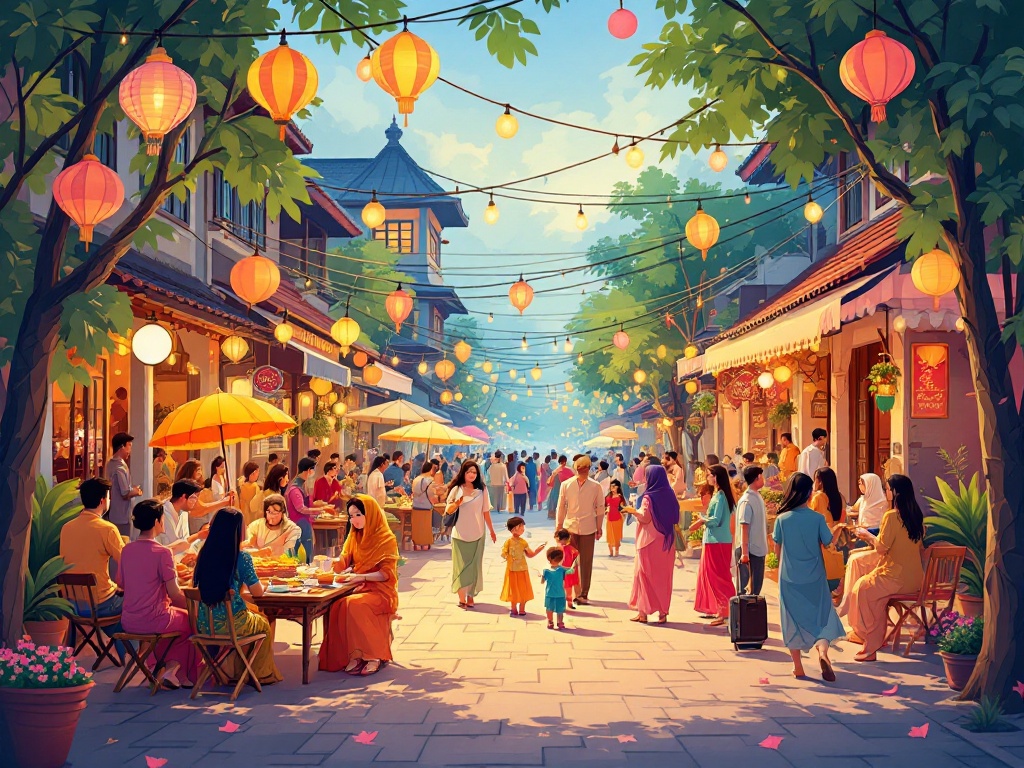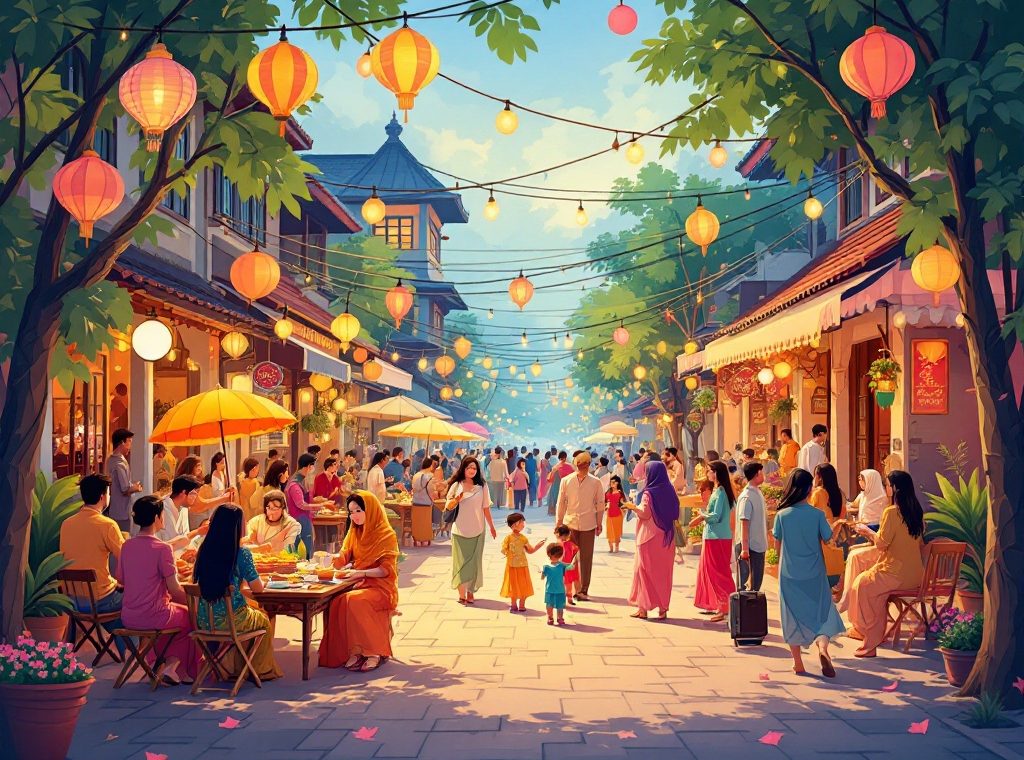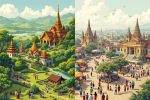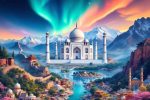Celebrating Local Holidays in Malaysia
Discover the vibrant tapestry of Malaysian public holidays! From religious observances like Hari Raya Aidilfitri and Deepavali to national celebrations such as Hari Merdeka, explore the rich cultural heritage reflected in each festival. Learn how federal and state laws govern these holidays, creating a unique blend of national unity and regional diversity. Delve into the traditions, rituals, and significance of each celebration, including the heartwarming open house custom and the massive homecoming of *Balik Kampung*. Start planning your Malaysian cultural experience today!
Important information

- Public holidays in Malaysia are a mix of federal holidays, observed nationwide, and state holidays, specific to each region. While most states observe 14 federal holidays, Sarawak observes 13.
- Malaysia’s multiculturalism is reflected in its holidays, with celebrations for Islamic, Chinese, and Hindu faiths, including Hari Raya Haji, Lunar New Year, and Deepavali.
- Unique harvest festivals like Gawai Dayak in Sarawak and Tadau Kaamatan in Sabah highlight the cultural diversity of different regions.
- Open houses, where people welcome everyone into their homes, and Balik Kampung, the tradition of returning home, are important cultural practices during holiday periods.
- Traditional performances, such as lion dances and gamelan music, play a vital role in Malaysian celebrations, showcasing the country’s rich artistic heritage.
Understanding Public Holidays in Malaysia
Malaysian public holidays are governed by federal and state regulations. The 1951 Holidays Act establishes holidays for Peninsular Malaysia and Labuan, determined by the federal government and observed nationwide. However, some exceptions exist. While most states and federal territories recognize 14 federal holidays, Sarawak observes only 13. For those planning to visit, the Malaysia Digital Arrival Card is a requirement for entry.
Federal and State Regulation
Federal law, specifically the Holidays Act of 1951, dictates public holidays in Peninsular Malaysia and Labuan. However, states also have the authority to declare their own holidays, creating a balance between national unity and regional diversity. This dual approach acknowledges the significance of national cohesion while respecting local cultural expression. For instance, a state might commemorate a unique event from its history.
Federal Public Holidays
Malaysia celebrates a variety of public holidays, both national and religious. National holidays include: Independence Day (Hari Merdeka), Malaysia Day, the King’s Birthday, Labour Day, and Christmas Day. Religious holidays such as Eid al-Fitr, Eid al-Adha, Awal Muharram, Chinese New Year, Wesak Day, Deepavali, and the Prophet Muhammad’s Birthday are also widely celebrated. Note that some holiday dates may vary annually.
State and Federal Territory Holidays
Malaysia observes 14 national public holidays. However, individual states and federal territories often add holidays celebrating events like the birthdays of their rulers or other important local occasions. Sarawak, uniquely, recognizes 13 federal holidays.
Cultural and Religious Diversity in Malaysian Holidays
Malaysia is a melting pot of religious festivals. Muslims observe Hari Raya Haji, the Festival of Sacrifice, with pilgrimages to Mecca for the Hajj. They also celebrate Awal Muharram, which ushers in the Islamic New Year. Beyond Islamic traditions, the country embraces a vibrant tapestry of other cultural celebrations. The excitement of dragon boat races and the savory taste of zongzi mark the Chinese Dragon Boat Festival. Later, during the Mid-Autumn Festival, families gather to admire the moon while enjoying mooncakes and colorful lanterns. For the Hindu community, Thaipusam honors Lord Murugan, while Pongal, a vibrant harvest festival, pays tribute to the Sun God. These diverse celebrations highlight Malaysia’s rich multicultural heritage. Don’t forget, if you’re planning a visit, the Malaysia Digital Arrival Card is essential.
Islamic Festivals: Hari Raya Haji, Awal Muharram
Hari Raya Haji commemorates Ibrahim’s willingness to sacrifice his son, a narrative of devotion. Awal Muharram marks the Islamic New Year. Both occasions hold deep significance, bringing families together in prayer and celebration.
Chinese Festivals: Dragon Boat, Mid-Autumn
Malaysia’s Chinese community vibrantly celebrates two key festivals. The first is the Dragon Boat Festival, which commemorates the poet Qu Yuan. The second, the Mid-Autumn Festival, marks the harvest season with mooncakes and lanterns.
Hindu Festivals: Thaipusam, Pongal
Thaipusam and Pongal are two vibrant festivals celebrated by the Tamil community in Malaysia. Thaipusam, held during a full moon in January or February, honors Lord Murugan. Devotees express their devotion through intense rituals such as body piercing and carrying kavadis. In contrast, Pongal is a harvest festival dedicated to the Sun God, Surya, observed in mid-January. A sweet rice dish, also called Pongal, is prepared and offered as thanks for a successful harvest. Both festivals feature prayers and vibrant cultural performances, showcasing Malaysia’s rich Tamil heritage.
Thaipusam
Celebrated during a full moon in January or February, Thaipusam honors Lord Murugan. Devotees show their piety through intense rituals like body piercing and carrying kavadis.
Pongal
Observed in mid-January, Pongal is a harvest festival dedicated to the Sun God, Surya. A sweet rice dish, also known as Pongal, is offered as thanks for the harvest.
Celebrating Major Festivals in Malaysia
Lunar New Year bursts with vibrant celebrations, symbolized by the dynamic lion and dragon dances that wish for prosperity and good fortune. Families reunite for special dinners and exchange red envelopes filled with money.
Hari Raya Aidilfitri signals the end of Ramadan, Islam’s holy month of fasting. Muslims celebrate with prayers, visits to loved ones, and feasts of traditional delicacies.
Deepavali, the Festival of Lights, is celebrated by Hindus who illuminate their homes with oil lamps and adorn them with colorful kolams, intricate decorative patterns. Prayers are offered and sweets are shared.
Lunar New Year: Traditions and Celebrations
Lunar New Year, also called Chinese New Year or Spring Festival, is a major 15-day celebration observed by Chinese Malaysians between January and February. Families gather, cleaning their homes to symbolize sweeping away bad luck and preparing special meals. Fireworks illuminate the night sky, and vibrant dragon dances, particularly prominent in Penang and Kuala Lumpur, fill the streets. On New Year’s Eve, families share a reunion dinner, donning red attire to ward off evil. The next day, married couples distribute red envelopes, known as Hong Bao, filled with money to children and single adults. Finally, the Festival of Lanterns marks the full moon with singing, dancing, and ubiquitous lantern displays, alongside lion dances symbolizing prosperity and good fortune. Remember, if you plan to travel during this time, the Malaysia Digital Arrival Card is a must.
Lunar New Year is a 15-day celebration observed between January and February.
Families clean their homes to symbolize sweeping away bad luck.
Fireworks and dragon dances fill the streets, especially in Penang and Kuala Lumpur.
Families share a reunion dinner on New Year’s Eve, wearing red for good luck.
Married couples give Hong Bao, red envelopes with money, to children and single adults.
The Festival of Lanterns celebrates the full moon with singing, dancing, and lantern displays, along with lion dances for prosperity.
Hari Raya Aidilfitri: End of Ramadan Festivities
Hari Raya Aidilfitri marks the end of Ramadan, the Islamic holy month of fasting. Muslims celebrate with prayers at mosques and visits to the graves of loved ones. Traditional dishes like rendang and ketupat are central to the festive meals shared with family and friends. Open houses welcome guests to share in the joyous atmosphere. New clothes and decorated homes add to the spirit of celebration and togetherness.
Deepavali: The Festival of Lights
Deepavali, the Festival of Lights, is a significant Hindu celebration in Malaysia, symbolizing the triumph of good over evil, light over darkness, and knowledge over ignorance. Malaysian Hindus decorate their homes with vibrant lights, traditional oil lamps (diyas), and elaborate rice flour kolams. Temples host prayers and rituals, while families share traditional Indian sweets and open their homes to everyone, fostering a sense of community and cultural exchange. This festive occasion emphasizes forgiveness, love, and strengthens family bonds, creating a time of joyous celebration and unity.
Unique State Holidays and Observances
Sarawak celebrates Gawai Dayak on June 1st and 2nd, marking the end of the harvest season and the start of the new planting season. Sabah observes Tadau Kaamatan on May 30th and 31st, a harvest festival specific to the Kadazan-Dusun community. Each state also has a public holiday to celebrate the birthday of its respective Sultan or Governor. The date of this holiday varies depending on the ruler and state. Travelers should be aware of these local holidays and ensure they have their Malaysia Digital Arrival Card in order.
Gawai Dayak and Tadau Kaamatan: Harvest Festivals
In Sarawak, Malaysia, the Dayak people, primarily the Iban and Bidayuh communities, celebrate the harvest festival known as Gawai Dayak on June 1st. In Sabah, the Kadazan-Dusun community observes their harvest festival, Tadau Kaamatan, typically in May. Both festivals are rich in tradition, featuring rituals, music, dance, and communal feasts. These vibrant celebrations offer thanks for a bountiful harvest and honor the region’s rich cultural heritage. Rice wine, *tuak*, plays a central role in the festivities.
State Ruler’s Birthday Celebrations
Malaysia’s states commemorate their respective Ruler’s Birthday with a public holiday, honoring the Sultan or Governor. These celebrations are steeped in tradition, often featuring parades and award ceremonies. These public festivities provide opportunities for communities to connect with their cultural heritage and demonstrate respect for their leaders.
Community and Cultural Traditions During Holidays
Open houses are a cherished Malaysian tradition, especially during festive occasions such as Hari Raya Aidilfitri, Chinese New Year, Deepavali, and Christmas. Families graciously open their homes to everyone—friends, family, and even strangers—to share in the celebrations and strengthen community bonds.
The Balik Kampung tradition, the heartwarming journey home, often leads to significant traffic congestion, particularly on major highways.
Beyond open houses, traditional performances enrich these celebrations. The vibrant lion dance is a staple of Chinese New Year, while the melodic strains of gamelan music frequently accompany Malay weddings and other joyous events. These beautiful art forms showcase Malaysia’s rich artistic heritage and are integral to its vibrant culture. For visitors experiencing these traditions, the Malaysia Digital Arrival Card is a prerequisite for entry.
Open Houses and Balik Kampung
Open houses are a cherished tradition during Malaysian holidays, fostering a strong sense of community. Families open their doors to everyone, welcoming friends, relatives, and even strangers, embracing people of all backgrounds. The tradition of *Balik Kampung* sees many traveling home for major holidays, creating a massive homecoming celebration as families reunite. These customs strengthen family ties and build community spirit during festive occasions.
Community Gatherings and Traditional Music
Malaysian community gatherings often showcase traditional music, highlighting the country’s rich cultural heritage through vibrant performances like gamelan, silat, and zapin. These artistic displays offer a platform for shared expression and foster social harmony. These gatherings connect people with their heritage, allowing them to celebrate their cultural identity and strengthen community bonds.












